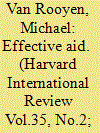| Srl | Item |
| 1 |
ID:
084323


|
|
|
| 2 |
ID:
125277


|
|
|
|
|
| Publication |
2013.
|
| Summary/Abstract |
Humanitarian assistance is aimed at providing rapid, life-saving support in settings of high population vulnerability, such as in times of war, disaster, or displacement. The provision of humanitarian assistance is complicated by severe access restrictions, large-scale emergency needs, displaced populations, and complex political and social settings. Both war and disasters create, and often amplify, existing economic disparities and contribute to an environment in which gender inequities, human vulnerabilities, and human rights abuses are likely to be exacerbated. The emergency response to large-scale humanitarian emergencies such as the 2010 earthquake in Haiti creates a sense of public urgency and political pressure to intervene. The last decade has seen significant advances in the standardization and coordination of relief and development activities, including improved mechanisms for coordination and accountability. While these efforts provided a solid basis for improved efficiency, they have faltered in recent large-scale crises. As the global relief and development community contemplates the next decades of humanitarian operations, a few essential questions should be raised: What are the most important barriers to providing effective aid? What future issues must be understood to optimize the efficiency of aid? What is the cost of inaction and what are the ramifications of not changing the system? This article will focus on some of the factors contributing to ineffective humanitarian aid and discuss the progress toward humanitarian reform, including the need for professionalism, coordination, and accountability.
|
|
|
|
|
|
|
|
|
|
|
|
|
|
|
|
| 3 |
ID:
131853


|
|
|
|
|
| Publication |
2014.
|
| Summary/Abstract |
I wish to confess to my friend who have a misconception that I am a very knowledgeable person, that it is not true. Whatever I say is probably based forty percent on knowledge and the rest is information. Anything claimed on the basis of information is not true knowledge. My friend Pawanji differentiation between knowing and believing/ assuming'. It is a fundamental differentiation. We know very little. Mostly it is what we believe in, and yet we claim that we are logical and not superstitious.
|
|
|
|
|
|
|
|
|
|
|
|
|
|
|
|
| 4 |
ID:
146461


|
|
|
|
|
| Contents |
This article develops and tests a theory to explain why perceptions of good government performance are a necessary but insufficient condition for the poor to trust their local government. The authors theorize that independent of partisan sympathies, the poor evaluate local government on the basis of government performance and the economic disparities that they observe in their neighborhood of residence. Accordingly, even if the poor hold positive perceptions of government performance, they are less likely to trust their local government when they live in a context of high economic inequality. To test their theory, the authors rely on census, public opinion, and systematic observation data collected within resident-identified neighborhood borders in each of seventy-one neighborhoods sampled from six municipalities in El Salvador. The findings are consistent with the hypotheses and indicate that economic inequality at the neighborhood level may produce a reservoir of distrust in local government among the poor. The results further highlight the political relevance of neighborhoods for the formation of citizen attitudes toward local government in the Latin American context.
|
|
|
|
|
|
|
|
|
|
|
|
|
|
|
|